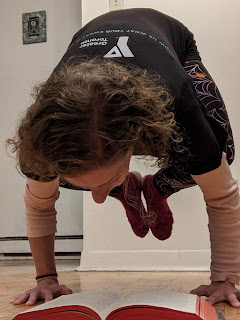LHC #98: "Jade City" by Fonda Lee. I loved this book, but I worry I'm never going to know what was in that letter from Enyi that Lan put in his desk for later.
"Exit Strategy" by Martha Wells. In the library race between eBook and hard copy, this time hard copy won.
"Akira Book 6" by Katsuhiro Otomo. Finished the series! Worth the effort even if I didn't completely understand it.
LHC #99: "Alice Payne Arrives" by Kate Heartfield. Long ago when I put this on my list I sent a note to the library letting them know the title had a typo.
"Alice Payne Rides" by Kate Heartfield. I might have gotten this one out because I didn't quite understand the ending of the previous. And the first one was such a quick read, so the time cost is low. I feel like these two could have been one book and it would have made more sense.
"Wear, Repair, Repurpose" by Lily Fulop. A little more basic than I wanted and not nearly long enough, but I did learn some things. I'm working on a short story about the future of fashion, so this might even count as research.
"A Rising Man" by Abir Mukherjee. Recommended by Marissa Lingen on her blog. The opium sections I found triggering. The rest was satisfying.
LHC #100: "Chinese Ghost Stories" by Lafcadio Hearn. I've read all these books, and yet the list keeps getting longer! What's up with that? The book is from like the 1880s, and written by someone who hadn't been to China and didn't speak any sort of Chinese, so I'm sort of dubious about the whole thing. My favorite story was the one about the tea.
"Made Things" by Adrian Tchaikovsky. His is a name that appears a lot on the lists I make after reading Locus and the internet (once again, Marissa Lingen), and it's short and available on Overdrive, so I took it out. It was very fun, and about stealing stuff and a heist gone wrong! Too many characters, though.
